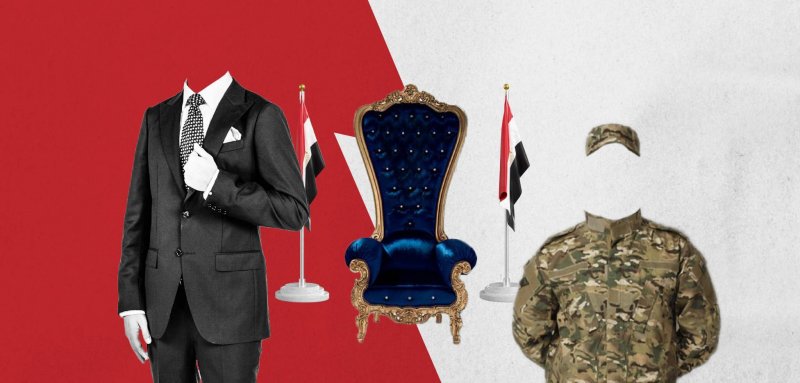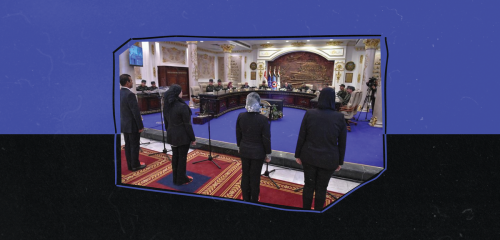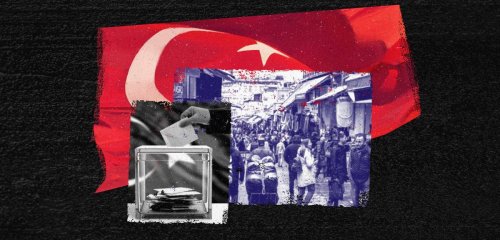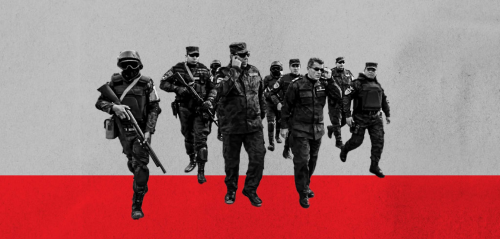Emad Jad's call, as the spokesperson for the Free Current coalition (aka al-Tayar al-Hurr), to nominate General Mahmoud Hegazy, the former Egyptian Chief of Staff, as a transitional president in the upcoming presidential elections, with the aim of facilitating a transfer of power to civilians, represents a personal viewpoint and does not reflect the official position of the liberal current.
Jad explicitly stated this in a Facebook post on September 14th, titled "A Call for the Nation". He emphasized, "This statement is written from a personal perspective", before the Free Current coalition, in a statement released on September 16th, clarified that it had no association with this proposal, stating, "The Free Current coalition disavows any connection to Mr. Emad Jad's suggestion of favoring a military background for Egypt's presidency and his endorsement of General Mahmoud Hegazy as Egypt's future president."
Jad reiterated this stance in subsequent interviews with the press, underlining that his call should not be misconstrued as representing the liberal current's official position.
The armed forces wield influence over all aspects of life, from major economic involvement to government employee appointments. It has control over all executive, media and educational institutions, making it hard for any non-military figure to reach presidency
Jad's call, when examined more deeply, is built upon two fundamental premises:
Firstly, President Sisi's tenure has been an unequivocal failure, pushing Egypt into a political, economic, and social impasse. Egypt has also lost its pivotal regional role as new powers and actors have risen. Moreover, the stifling political climate has extinguished dissenting voices, with opposition figures being pursued and imprisoned. Consequently, Jad asserts that "Egypt cannot endure a continuation of its current policies in the foreseeable future" and views his call as a "sincere attempt to chart a way out of the stifling status quo and the state of impasse we have reached," as outlined in his statement.
Secondly, Jad posits that resolving the current crisis is not practical or feasible without the cooperation and involvement of the armed forces. This is the most critical aspect of his call, and it merits more thorough consideration in discussions.
Sisi.. not a partner in Egypt's future
The situation on the ground in Egypt undeniably reflects the military's stranglehold on all aspects of life. This dominance extends from substantial economic involvement to direct interference in the appointment of government employees, including teachers and mosque preachers. Furthermore, these individuals undergo military training in the military academies to secure their loyalty. The military also exercises full control over all branches of executive, media, religious, cultural, and educational institutions. This control matrix makes it exceptionally challenging for any non-military figure to ascend to the presidency. In light of this, Emad Jad argues that the "new president, in my estimation, must emerge from the echelons of state institutions, whether civilian or military, in whom the military establishment places its trust. This individual should jointly oversee the process of extricating sovereign state institutions from economic entanglements and areas that fall beyond their purview."
The statement is to identify an alternative candidate – other than President Sisi – whether civilian or military, in whom the military establishment has faith and is willing to cooperate with to disentangle the "sovereign state institutions", namely the military and intelligence agencies, from economic affairs and other spheres. The crux of this proposal emphasizes that the forthcoming transitional president must "initiate a referendum to nullify the 2019 amendments, restoring the separation of powers and safeguarding the autonomy of oversight bodies." The reference here is to constitutional amendments that consolidated authority in the hands of the president, curtailing the judiciary and oversight entities.
Emad Jad's call echoes the sentiments of a substantial segment of Egyptians who hold bleak prospects for meaningful change under the current regime, seeing the elections as unlikely to alter the status quo, given the regime's control over state institutions
While Emad Jad acknowledges the infrastructure projects accomplished during President Sisi's tenure, this commendation appears largely symbolic. He squarely attributes Egypt's present economic and political decline to President Sisi, contending that his bid to amend the 2014 constitution (via the 2019 amendments) to secure an additional eight years in office, beyond the originally stipulated term, precipitated Egypt's current woes. Given the absence of autonomous mechanisms to forestall such maneuvers, Jad is wary that there is no guarantee that the president will refrain from introducing further surreptitious amendments to serve other personal interests.
A statement to military commanders
Therefore, Emad Jad's statement is not primarily addressed to the Egyptian populace, who, by and large, find themselves in a precarious position grappling with economic hardships, inflation, surging prices, and the depreciating local currency. Instead, it is an implicit appeal, directed towards the military, imploring them to throw their weight behind an alternative presidential candidate and collaborate for comprehensive reform, and "The call aims for a consensus-based solution with our military institution, whose role we recognize and appreciate at all levels." This is why he requests a "thorough and careful consideration of this proposal" to understand what is left unsaid in the statement, not just what is explicitly mentioned.
In reality, Emad Jad's call does not represent his voice alone. It echoes the sentiments of a broader swath of Egyptians who hold bleak prospects for meaningful change under the current regime. These individuals harbor little faith that the upcoming elections can herald change, given the regime's comprehensive control over state institutions. This predicament effectively renders the presidency all but inaccessible to anyone beyond President Sisi, especially since the regime remains steadfast in evading accountability and attributes its missteps to external factors beyond its sphere of control. It's a realistic and pessimistic call that hopes and waits for the military to present an alternative from within its ranks – whether active or retired personnel– in a safe manner. This alternative should mend what it can while not depriving them of all their privileges at the same time because it is the "only" entity capable of making a change in the current equation.
Candidates cannot run for presidency without the endorsement of SCAF, a military council presided over by Sisi, who seems to be preparing to enter the elections himself, and any objections would be submitted to an entity under the direct influence of Sisi as well
?Making internal headway
Emad Gad, undoubtedly cognizant of the complexities from his active role in politics and association with the Center for Strategic Studies at Al-Ahram, acknowledges that proposing an alternative candidate is a precarious endeavor. It is neither straightforward nor guaranteed to succeed, especially without potential clashes among military leaders. The underlying reason being President Sisi's enactment of a law, ratified by the parliament and himself in July 2020, stipulating that "officers, both in active service and retirees of the Armed Forces, may not seek candidacy in presidential, parliamentary, or local council elections unless granted approval by the Supreme Council of the Armed Forces (SCAF)." Furthermore, it permits individuals affected by this ruling to "challenge the decision before the High Judicial Committee for Armed Forces Officers."
In essence, General Mahmoud Hegazy, or any other prospective candidate, cannot run for the presidency without securing the blessing and endorsement of the Supreme Council of the Armed Forces (SCAF), an entity presided over by President Sisi himself, who, according to all prevailing indications, is preparing to enter the upcoming elections. In the event that Hegazy, or anyone else for that matter, should object, their recourse would be through the "High Judicial Committee for Armed Forces Officers," an entity under the direct influence of President Sisi as well. The motivation behind President Sisi's amendments was to prevent military personnel from participating in elections, aiming to prevent a recurrence of the experiences witnessed during the 2018 elections with General Ahmed Shafik, General Sami Anan, and Major Ahmed Qonswa. Basic logic suggests that it would be incongruent for Sisi to issue a prohibition only to subsequently endorse or (allow) General Mahmoud Hegazy to run, especially when, as Emad Gad articulates to Al-Manassa website, "Hegazy possesses charisma, exhibits considerable cultural depth, and maintains a heightened political awareness. He has been intricately involved with political realities and statesmen since 2011. The only two individuals fit to spearhead the nation through a transitional phase toward civilian governance were General Mohamed El-Assar, may he rest in peace, and General Mahmoud Hegazy, may he enjoy good health, given their deep-seated commitment to democratic principles. With General El-Assar's unfortunate passing, General Hegazy remains the sole viable candidate."
Emad Gad's statement and dialogue are not directed at General Mahmoud Hegazy himself. In fact, he explicitly states that he hasn't been in touch with Hegazy in recent times, nor has he crossed paths with him for the past eight years. Gad's address is aimed at those who possess the capacity to advocate for Hegazy as a representative for civilian interests. Gad does not offer any guarantees that Hegazy would be amenable to this role beyond his personal knowledge of the man and his belief in the civil state, forgetting that changing circumstances can alter beliefs and convictions, will be justified by the man and by those around him.
Ahmed Tantawi as Egypt's President
The pressing question in this scenario is why people are seeking a seemingly improbable and uncertain solution from within the military establishment, instead of rallying behind an existing candidate who has already declared his candidacy, namely Ahmed Tantawi. Notably, Tantawi possesses a poised and dignified demeanor. He maintains an impeccable record, and periodically presents a politically and economically sound vision, doing so in television and newspaper interviews while awaiting the unveiling of his election program, which he has indicated is being meticulously prepared by experts, and above all, what sets Tantawi apart is that he is bold. He consistently criticizes the President and his regime at their core, all without falling into legal traps that could lead to his arrest, trial, and imprisonment – a fate that has befallen other politicians, most recently Hisham Kassem, Chairman of the Free Current Party, who the party declared, in a statement released on September 17th, had been a potential presidential candidate.
In fact, an impartial observer would find Ahmed Tantawi to be an exemplary figure in the context of an election campaign unfolding within a dictatorial state, starting with his efforts in Lebanon to study specific and regional affairs, and understand the intricacies of alliances and numbers, then boldly announcing his intention to run for the presidency, along with the date of his return to Egypt. Subsequently, he secured a suitable campaign headquarters in central Cairo, assembled members of his election campaign team across all governorates, then went on to make visits to local offices, conduct dialogues with volunteers, and ensure their training is overseen by experts. This extensive groundwork is accompanied by an increasingly prominent media campaign, which began with sporadic dialogues and steadily escalated. Through this media campaign, Tantawi addresses Egypt's prevailing problems, offering his scientifically and practically grounded solutions. He does so with calm and compelling responses to any criticisms leveled at him or his campaign.
Moreover, his discourse consistently emphasizes the significance of upholding the constitution, understanding the role of the presidential institution and the president himself in the prospective regime. Tantawi's rhetoric serves as a model for democratic governance – an element notably absent in Egypt, and indeed, in many countries across the region. While some nations may superficially embrace such principles, they often fail to genuinely endorse power rotation or the separation of powers.
This balanced discourse, coupled with his composed and steady personality, has garnered endorsements from several cultural and social figures. Individuals like Mohamed Ghoneim, Hassan Nafaa, Alaa Al-Khayam, Maamoun Fendi, Khaled Fahmy, Hafez Al-Mirazi, and others have publicly thrown their support behind Ahmed Tantawi. However, the majority remains skeptical of Tantawi's prospects of winning the elections, even if he is permitted to run in the first place. There's a strong possibility that efforts will be made to impede his ability to secure the required number of endorsements. Furthermore, even if he manages to overcome these challenges (a feat that appears highly improbable), he would inevitably confront a deeply entrenched state apparatus that may resist cooperation with him and could even actively work to undermine his presidency, as seen in previous instances.
The influence of regional and international powers
In practice, the upcoming presidential elections in Egypt appear incredibly complex. On one hand, the current president, Abdel Fattah al-Sisi, who is the likely candidate for these elections, maintains a stranglehold on power, bolstered by a series of laws that hinder strong contenders from running. This includes figures like Gamal and Alaa Mubarak, current and retired military leaders, who are prevented from seeking the presidency. Additionally, al-Sisi has firm control over all government and semi-governmental media outlets, which launch relentless attacks against his competitors while hosting individuals who express fervent support for the president—akin to Moussa Mustafa Moussa, who ran against President Sisi in 2018 while openly endorsing him.
Simultaneously, President Sisi faces widespread public anger due to the dire economic conditions that have afflicted various segments of the Egyptian population. This includes those who were financially comfortable during Hosni Mubarak's era, such as the middle and upper-middle classes, as well as senior government employees. In addition to domestic challenges, he grapples with regional and international rejection, although the full extent and contours of this opposition have yet to be explicitly revealed. Unofficial information channels, connected to these influential forces, convey messages through Twitter and YouTube, insinuating that the president is responsible for the economic downturn due to the military's control over the economy. These channels argue that he should adhere to the ten years he has already spent in power, allowing others with viable solutions a chance to lead. They insist that countries that have previously supported him are unwilling to bear the cost of his failures. These nations will not provide more assistance unless aid funds are optimally utilized, reaching their intended recipients and contributing to genuine development.
The political landscape is indeed complex, but the coming days will gradually clarify its ambiguity.
* The views and opinions expressed in this article are those of the author’s and do not necessarily reflect the official policy or position of Raseef22
Raseef22 is a not for profit entity. Our focus is on quality journalism. Every contribution to the NasRaseef membership goes directly towards journalism production. We stand independent, not accepting corporate sponsorships, sponsored content or political funding.
Support our mission to keep Raseef22 available to all readers by clicking here!
Interested in writing with us? Check our pitch process here!










